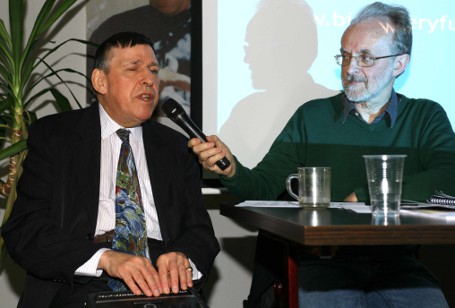HCLC Patron Lord Low CBE wins Liberty Human Rights Award!
4/12/2014
Hackney Community Law Centre is delighted that one of our Patrons Lord Low of Dalston (pictured left with HCLC Chair Ian Rathbone) has won Liberty’s Human Rights Campaign of the Year Award.
Lord Low received the award at a ceremony earlier this week.  He said: “I was delighted to receive this award because it highlights our success in greatly extending the application of the Human Rights Act to social care situations. When we consider the extent of cruelty, abuse and neglect which we daily read about in our newspapers, this is a vitally important step forward.”
He said: “I was delighted to receive this award because it highlights our success in greatly extending the application of the Human Rights Act to social care situations. When we consider the extent of cruelty, abuse and neglect which we daily read about in our newspapers, this is a vitally important step forward.”
Age UK nominated Lord Low for the Award because he has championed human rights and the protection of disabled and vulnerable people for over four decades. In May 2014, he led a campaign which extended greater human rights protection to hundreds of thousands of older and disabled people receiving care services as the landmark Care Bill, now the Care Act, took centre stage in the House of Lords.
The Bill aimed to change the law to protect adults at risk of abuse and neglect and is an important step forward in offering better protection to people receiving care services. It also provided an opportunity for Parliament to correct an anomaly which excluded some people receiving care from protection under the Human Rights Act 1998 (HRA). A loophole in human rights law had emerged where coverage under the HRA for those receiving care services depended on what that service was, how it was funded and who arranged it. For many, human rights abuses could take place with no option for legal redress under the HRA.
Lord Low sought to reverse this injustice. He introduced an amendment to the Care Bill to make sure that all social care services regulated by the Care Quality Commission would have responsibilities to people receiving those services, under human rights law. Although Lord Low’s amendment received cross-party support in the House of Lords and was passed by 247 votes to 218, it was later overturned in the House of Commons. However, over the course of the three month debate between the House of Lords and House of Commons, Lord Low took on this complex issue and championed it against clear resistance from Government Ministers.
He expertly negotiated with Government and Peers across all parties. His efforts were supported by a public campaign led by Age UK and a coalition of a dozen charities and 17,500 people who signed a petition calling for the Government to recognise older and disabled people’s human rights in whatever care setting they lived. In the very final stages of the parliamentary process, Care Minister, Norman Lamb, said he recognised the strength of feeling and would look for a solution. Consequently, the Government proposed its own amendment to the Bill, which was accepted by both Houses.
The result is that human rights protection now includes all those who receive residential care or care provided in their own home which is arranged or funded by a local authority. For the hundreds of thousands of older and disabled people who had previously been left unprotected, this achievement is hugely significant and was a direct result of Lord Low’s leadership and commitment to protecting human rights. This does not mean the loophole has been completely closed, unfortunately, people whose care is entirely privately arranged and funded are still excluded from human rights protection and this remains a cause for concern. However, where a self-funder asks their local authority to arrange their care, they will benefit from human rights protection, even though they are paying for their own care.











CONNECT